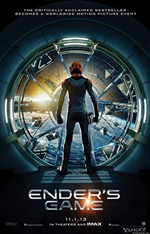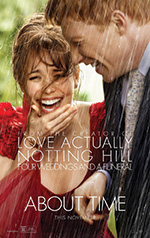Ender’s Game is poisoned by its author’s anti-gay attitude
by Jorge Ignacio Castillo
 Ender’s Game
Ender’s Game
Galaxy
![]()
The idea that a work of art should always be judged solely on its own merits, rather than how one feels about its creator, is a nice thought — and one that’s also proper most of the time.
But sometimes it’s just not possible.
That’s the problem with Ender’s Game, based on the 1985 novel of the same name written by Orson Scott Card. Along with being an award-winning author, Card is a religious zealot, high-profile activist against LGBT rights (he used to sit on the board of the viciously homophobic National Organization For Marriage) and all-around right-wing nutjob who compared Obama to Hitler earlier this year.
Though his book Ender’s Game is beloved, these days Card is most certainly not. He was slated to write a Superman comic for DC but a gargantuan outcry and threats of boycotts led the company to dump him.
He is a nasty, unwell, pitiable and very toxic creature.
So: what the hell to make of this movie?
At an undetermined point in the future, Earth has repelled an alien invasion. We’ve been preparing for a second attack for decades. The strategy is to hand-pick a group of highly intelligent kids and prepare them to lead the counterattack. The most promising cadet is Ender Wiggin (Asa Butterfield, Hugo), a sensitive teenager with a knack for strategy.
Ender flies through the different stages of training, beginning each one of them as an outsider but ending up in a position of command. He’s got reservations about what’s expected of him, but his willingness to sacrifice his peers for the greater good in both the exercises and daily life is constantly rewarded, morals be damned. To his superiors, Ender is shaping up to be the perfect weapon for a preventative strike.
Fans of the book may be put off by the softening of certain events and the removal of the most openly political segments of the novel (although the undertones remain), but the simplification works well. Director Gavin Hood (Tsotsi, Wolverine) doesn’t shy away from the main issues the novel deals with, which are far more complex than your average young-adult fare.
Written at the height of the Cold War, Ender’s Game is decidedly anti-militaristic, and although the conceit of jaded elders sending young people to fight their battles is hardly new, it works here. The movie owes a fair debt to Stanley Kubrick: it’s often reminiscent of Full Metal Jacket, with a pinch of Dr. Strangelove: Question authority at all times.
As CGI-loaded as it is, Ender’s Game never loses sight of its characters, and the grey area between computer-generated imagery and practical components is even used to the film’s advantage in a powerful twist at the end. On the downside, the fallout that ensues feels rushed and brief, particularly because the stakes were so painstakingly established. As well, some important characters in the book are barely developed. The pivotal relationship between Ender and his elder sister Valentine (Abigail Breslin), for example, suffers because of it.
Unlike his recent appearances on screen (Cowboys & Aliens, Paranoia), Harrison Ford puts a real effort into Ender’s Game — and there’s a certain pleasure in seeing the ultimate space outlaw playing The Man. Butterfield, meanwhile, consolidates his position as one of the most promising young actors out there: his currency is soulfulness, a more lasting trait than mere good looks.
If Ender’s Game were just another sci-fi romp with no ulterior intent, I’d recommend it unreservedly. But it’s not. The book (and consequently the film) is so loaded with ethical quandaries and grandstanding, and the author’s current activities are so unsavoury, that you can’t separate the art from the baggage.
The thought of putting extra dollars in Card’s pocket makes me uneasy. Proceed at your own risk.
feedback@prairiedogmag.com
[hr]
 12 Years A Slave
12 Years A Slave
Opens Nov. 1
![]()
12 Years a Slave is an excellent movie that demands a lot from its audience. Much like Schindler’s List or Requiem for a Dream, it’s a tough, harrowing experience, thanks to director Steve McQueen’s (Shame, Hunger) painfully realistic approach to slavery in the antebellum south. That veneer of genre that made Django Unchained tolerable? It’s nowhere to be found here.
12 Years a Slave is based on Solomon Northup’s 1853 autobiography, one of the few real-life portrayals of life on a cotton plantation from a slave’s point of view to survive to today. Once a free man making a pretty decent living as a violinist in New York, Northup (Chiwetel Ejiofor) is kidnapped and sold to a southern landowner — and suddenly, he’s no longer a person. Along with the obvious challenges, Northup must fight to avoid internalizing the seeming hopelessness of his situation without being perceived as a threat.
There’s no shortage of quality actors willing to appear as horrible slave owners here, from a mildly oblivious Benedict Cumberbatch to an utterly sadistic Michael Fassbender. This is Fassbender’s third collaboration with McQueen, who continues to push him to explore the extremes of the human condition. Their relationship is reminiscent of the Scorsese-DeNiro combo during the ’70s.
But the weight of the movie rests squarely on Ejiofor (2012, Serenity). Ejiofor’s contained performance could be mistaken for a lack of range, but nothing is further from the truth. His unassuming command of the screen is what keeps us watching, even when we’d much rather avert our eyes.
Expect the Academy to reward 12 Years a Slave lavishly this February.
[hr]
 About Time
About Time
Opens Nov. 8
![]()
Maybe it’s the fact that the male leads are as much bumbling goof as they are handsome heartthrob; maybe it’s because the women involved have actual personalities rather than just an overinflated pair of… well, you know; maybe it’s just an overall knack for charm and charisma.
Whatever it is, it makes British romantic comedies like Love, Actually, Four Weddings and a Funeral and Notting Hill consistently superior to their Hollywood counterparts.
About Time fits easily among those titles. Tim Lake (Domhnall Gleeson, Bill Weasley in the Harry Potter saga) is a hopeless romantic who just wants to meet the love of his life — but has zero luck with the ladies. Shortly after striking out yet again, his father (the reliable Bill Nighy) lets him in a family secret: men in the Lake family can travel back in time just by concentrating. There’s just one rule: you can only go back to a moment of your own life that you’ve already experienced.
Tim quickly chooses the time he met Mary (Rachel McAdams), a pixie dream girl. Soon enough though, Tim learns that even time travel can’t prevent all of life’s challenges — and that people don’t necessarily want to be “fixed.”
About Time doesn’t burden itself with the paradoxes and butterfly effects of time travel (a number of holes can be poked into the plot as a result, if you’re into that sort of thing): the message is simply that a life well lived makes special powers irrelevant. The movie flirts a bit too close with the idea of turning Gleeson into a Hugh Grant clone, but Gleeson avoids the trap by providing his character with a kindness that rings true.
About Time is well-written and impeccably acted — about the only fault you could find with it is that it presents an overly idyllic image of London, free of all social malaise. But as date movies go, I challenge you to find a better option. /Jorge Ignacio Castillo





